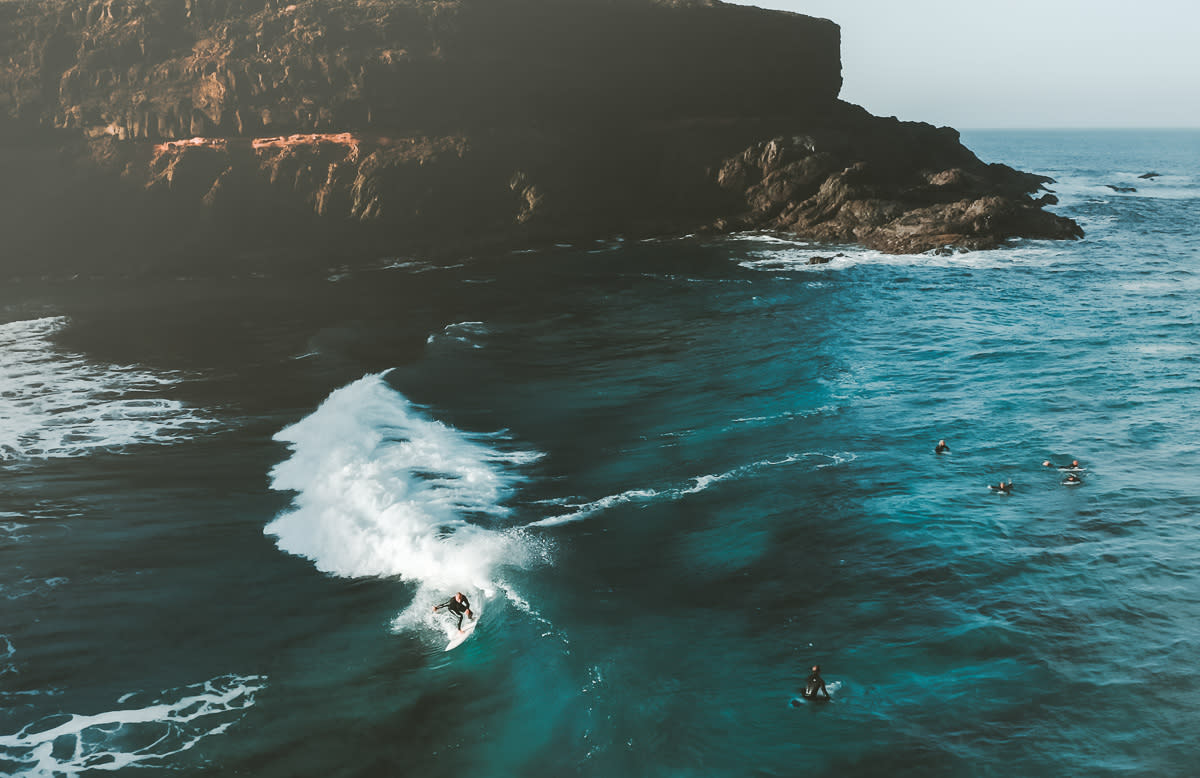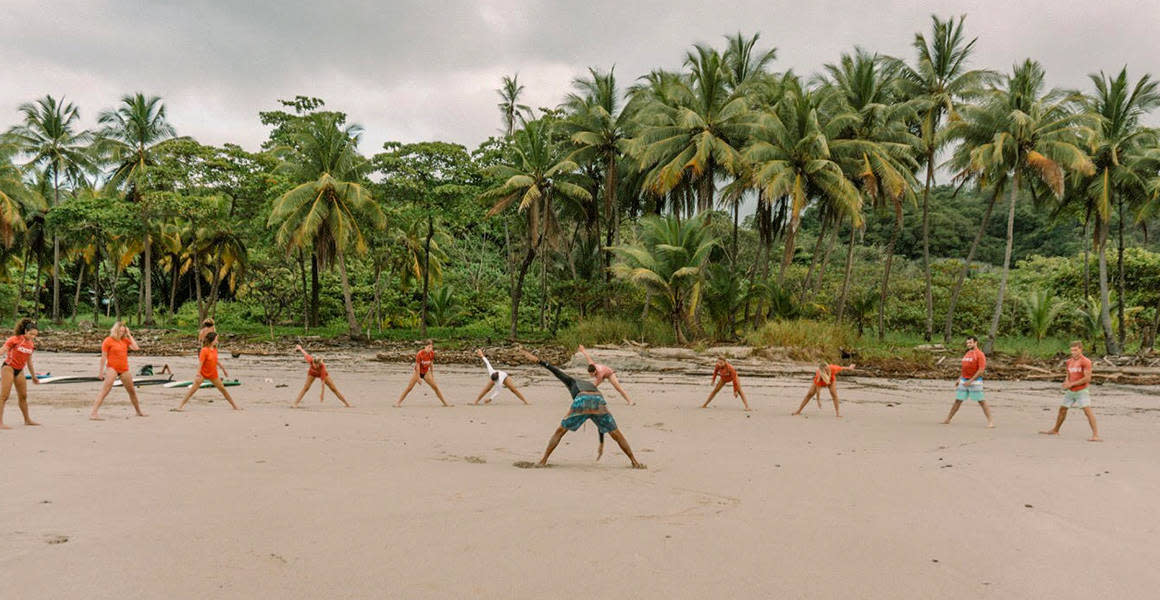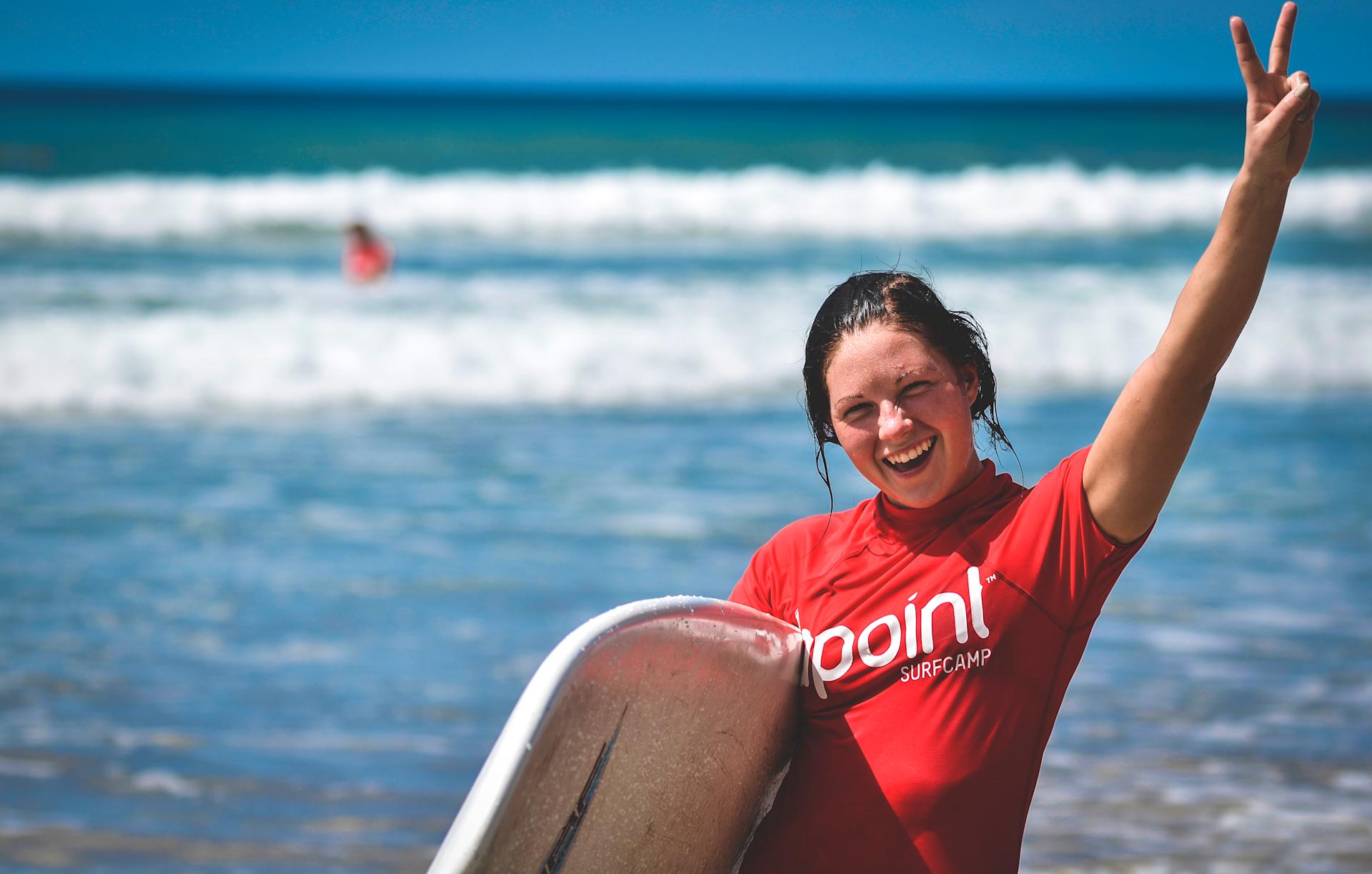
Top 10 Tips for Planning the Perfect Surf Trip
February 19, 2025What comes to mind when you think of surfing? The feeling of riding a green wave? Waves crashing on the shore? Or maybe a cool drink in your hand as you watch the sunset of a perfect Balinese day?
Whatever your vision looks like, one thing is clear: organising your trip is just as important as packing your board. This is why we decided to create a list of 10 helpful tips to ensure an unforgettable adventure.
#1 - Choose between a surf camp or a surf hotel to stay in
Once you are ready to organise your trip, the first step is choosing between a surf camp or a surf hotel. If improving your surf is your primary concern, a surf camp will be a great choice. Camps include great accommodation, structured surf lessons with professional feedback, and other activities. If you rather plan all day by yourself and explore solo, a surf hotel might be the best choice.
Your decision between the two will shape your adventure. If you need guidance choosing the most suitable option, reading reviews of previous guests might help provide insight on which of them you may enjoy more.
We also created a list of the best surf camps to learn how to surf, which is super helpful if you are interested in surf camps.
#2 - Surf camps mean more surf practice

Surf camps help you take your surfing to the next level. No matter if you are a complete beginner, intermediate or advanced. The surf instructors will provide you with all knowledge needed to either learn how to catch a wave or to smoothen out small mistakes - which will make a real difference when catching green waves. You will receive high-quality feedback, are able to progress faster and end up having more fun in the water. Additionally, you’re surrounded by likely minded people sharing the same love for the ocean as you.
A great thing about surf camps is the choice of healthy food which is suitable for the amount of time you’ll spend active in the ocean.
Another big advantage of choosing a camp is the ability to choose a surfboard from a large selection. That way you can try out lots of different equipment, which is brilliant if you choose to buy your own in the future.
#3 - You can learn to surf during your vacation
Of course, you can learn how to surf during your surf vacation! It's not as difficult as you might think, although it might not be as easy either. If you’re completely new to the sport you might think it’s tough at the start but by the end of your stay you most probably end up being hooked on the feeling and lifestyle.
If you're already an advanced surfer, you can try the latest surf gear and benefit from the local knowledge of instructors to find the best spots.
Top tips for beginner surfers planning a surf holiday:
Surf gear is expensive, and you might find it hard to choose the right gear for yourself at the start. A surf camp will help you figure out which board type is suitable for you;
Once you are able to surf by yourself you can rent gear from local surf shops'
Try to research different countries to find spots that suit your style of surfing (longboarders, short boarders or bodyboard enthusiasts prefer different types of waves);
Wear zinc or waterproof sunscreen with at least SPF 30+, as the reflection of the ocean causes much stronger sun damage than on land (there are great sustainable brands available);
You might need reef boots in the area to prevent cuts on your feet;
Find out all the surfing terms & surfer lingo to help you understand the surf language;
Keep your luggage light to make the journey easy.
#4 - The safest (& best) countries for surf travel

Portugal: Europe’s heart of surfing with approx. 3000 hrs of sunshine annually and 850 km of coastline with amazing beaches and breathtaking cliffs – all you need for an exceptional surf vacation;
Australia: when it comes to the quality of waves, amazing and diverse nature, and a lovely culture, Australia has it all;
Bali, Indonesia: If you ever thought of going on a surf trip, you probably considered Bali - one of the world’s best surfing destinations;
Norway: this country has several surf spots and a lot of different waves to explore;
Costa Rica: the Pura Vida surf & chill lifestyle might be just what you need.
RELATED: Best Places to Learn How To Surf
#5 - What to pack for your next surf trip (essential surf travel items)
Surf trips are always fun. Our planet offers many different places to visit and cultures to explore. Therefore, your surf trips and essential items needed may vary a lot. But there is a few that you most likely need on every trip:
Surfboard... no surfboard? no surfing. Easy. But wax, leash and fins are easy to forget - and without them, there will be no surf either;
Beach towel: makes getting changed after a surf lesson much easier;
Hat: perfect protection against a sunburnt scalp or sunstroke;
Reef Boots: they might feel weird at first, but they prevent cuts when entering reef spots;
Wetsuit: keeps you warm so you can surf longer and progress faster;
Phone, Camera + chargers: Don’t forget them! Photographs and videos are a great way to create lasting memories of your trip;
Sunscreen: protects your skin against UV damage, especially light skin tones in tropical countries.
#6 - Getting ready for your surf trip
It’s super useful to start exercising at home to make the start of your surf training easier.
You can try to work on your cardio and lookup fitness or yoga exercises that provide you with core-, back- and shoulder strength, flexibility and balance.
You can look up surf videos too! They will help you understand the take-off techniques and right positioning on the board and maybe even the rules at the Line-Up.
#7 - Get to know the local culture during your surf holiday
Surf holidays are an excellent opportunity to get to know cultures with different traditions, foods and lifestyles. Learning about cultures will open your mind and make your trip more special. You will meet amazing people and might even pick up a few words of a new language. You can also visit local workshops, try artisanally produced foods, traditional goods or art museums.
#8 - The best surf cities with local surf schools
There are many great surf cities around the world, from Puerto Rico to Indonesia. Here are some suggestions for your next surfing adventure:
Santa Teresa (Costa Rica): With its Jurassic Park-like nature, breathtaking waterfalls, active volcanoes, wild jungles, and pristine beaches, everything is set for an adventure out of the ordinary;
San Diego (USA): Surfing is one of America's favourite pastimes; it should be no surprise that this city has some excellent resources for beginners as well as experts alike;
Ericeira (Portugal): If you are looking for a surf trip where you can score some good waves in the morning, go explore the typical Portuguese town in the afternoon and end the day dancing the night away at a local bar, Ericeira is for you!
Fuerteventura (Spain): If you're looking for a more exotic spot, these islands off West Africa are home to some fantastic waves across many diverse beaches. Some surfing schools here will teach you how to do tricks while others cater to those with experience. But all will be guided by experts whose goal is your safety;
Canggu (Indonesia): One hour south of bustling Kuta Beach lies Indonesia's hidden gem: Candidasa Village near the Bukit Peninsula, which offers up the best surfing in Bali. The waves are perfect for beginners, and it's one of Indonesia's most environmentally-friendly spots, too;
Hoddevik (Norway): Norway is for those who are hungry for adventures and looking for something off the beaten path. Immerse yourself in a bewitching world of wild nature and one-of-a-kind experiences in the north;
Taghazout Bay (Morocco): Morocco isn't typically thought of as a world-class destination for surf, but you should not worry—Taghazout Bay has you covered. This bay on the outskirts of Agadir offers up some great waves for surfers at any skill level;
Linga Longa Reef (Brazil): Brazil is one of the best places to surf in South America. If you want something different, go to the Rio Grande do Sul. Many waves are different from each other. One spot worth checking out is Linga Longa Reef which has been named among the top ten surf spots in South America;
Ahangama (Sri Lanka): Sri Lanka is an exotic destination. Enjoy the friendly line-ups, sip on a coconut drink under the palm trees, and get close to the wildlife of the jungle. It's time for adventures!
#9 - Travelling with or without Board
A surfboard is the most important thing you need on your vacation. But if you don’t like heavy luggage, renting a surfboard locally might be worth considering. You can check out the destination beforehand and see what boards will be available to rent. Some shops even offer to deliver your board to the place you stay.
If that’s not for you or you feel like you want to stay for a longer amount of time, you can look up surf shops and schools that might sell second-hand boards, which you can sell again when it’s time to leave.
If you're planning on travelling with your surfboard, it's worth checking out size/ weight restrictions and additional fees the airline might charge for your board. You can find the information on their website or call customer service.
You can also rent a car, either through a surf camp or airport.
#10 - Invite a few friends to join you on your trip

Feel free to invite friends to join your trip! You'll be able to share expenses and are able to have a lot of fun and create great memories with someone you are sure to get along with.
If you're going to be staying in the same place for a while, it might be worth renting out a house or flat with friends. You can look into booking a shared room together too - this will help keep costs as low as possible.
Conclusion
If travelling solo is quite new to you and you feel nervous, we hope to have assisted your planning and decision making. We also hope this post has boosted your confidence and might have changed your anxiety into excitement!
Because whether it's your first or 10th surfing vacation, the suggestions provided will help you have an unforgettable experience.
If you need more information on anything related to surf vacations, let us know! We are more than happy to help.
NEWSLETTER
Stay up to date, sign up for our newsletter

Maren Gimnes
Maren is a copywriter and content creator with a true passion for exploring the beautiful planet we call home. Her love for the ocean and salty days brought her to Lapoint, where she’s been living the digital nomad life and visiting our surf camps in all corners of the world. Maren aims to inspire others to pursue the surf lifestyle, to never miss a sunset and to follow their dreams.

